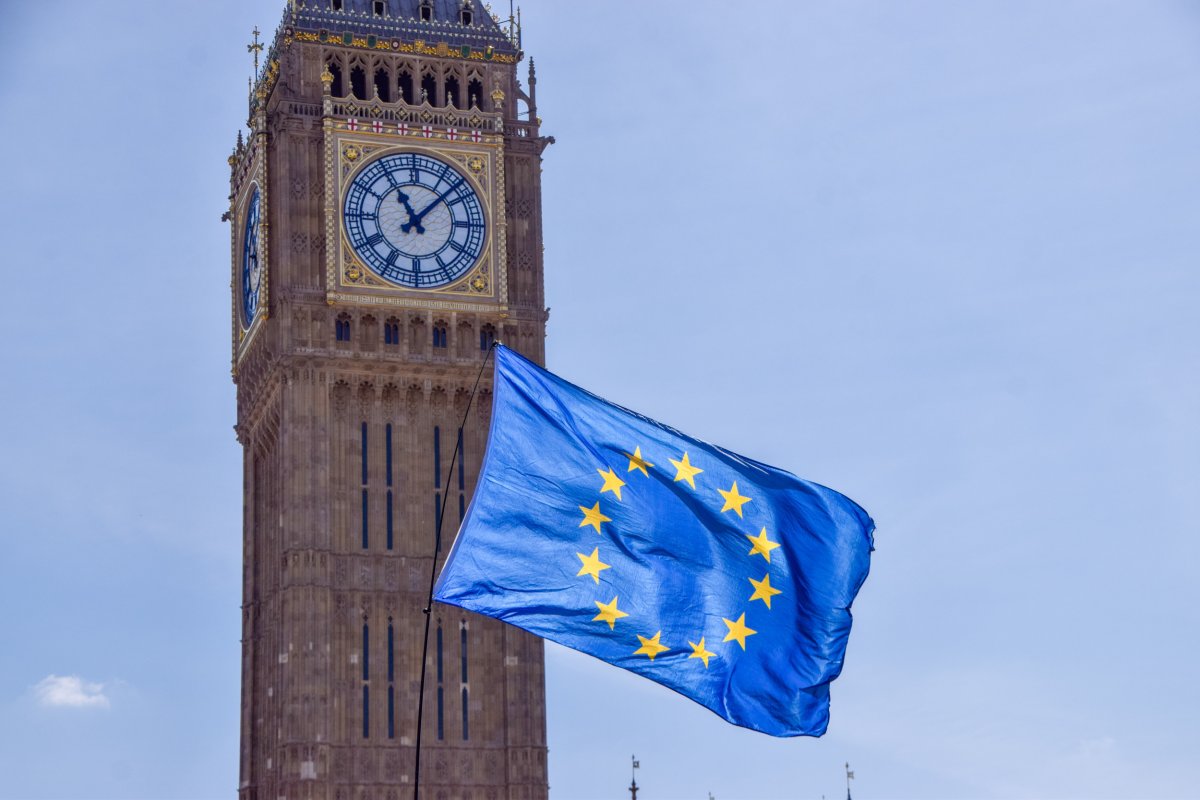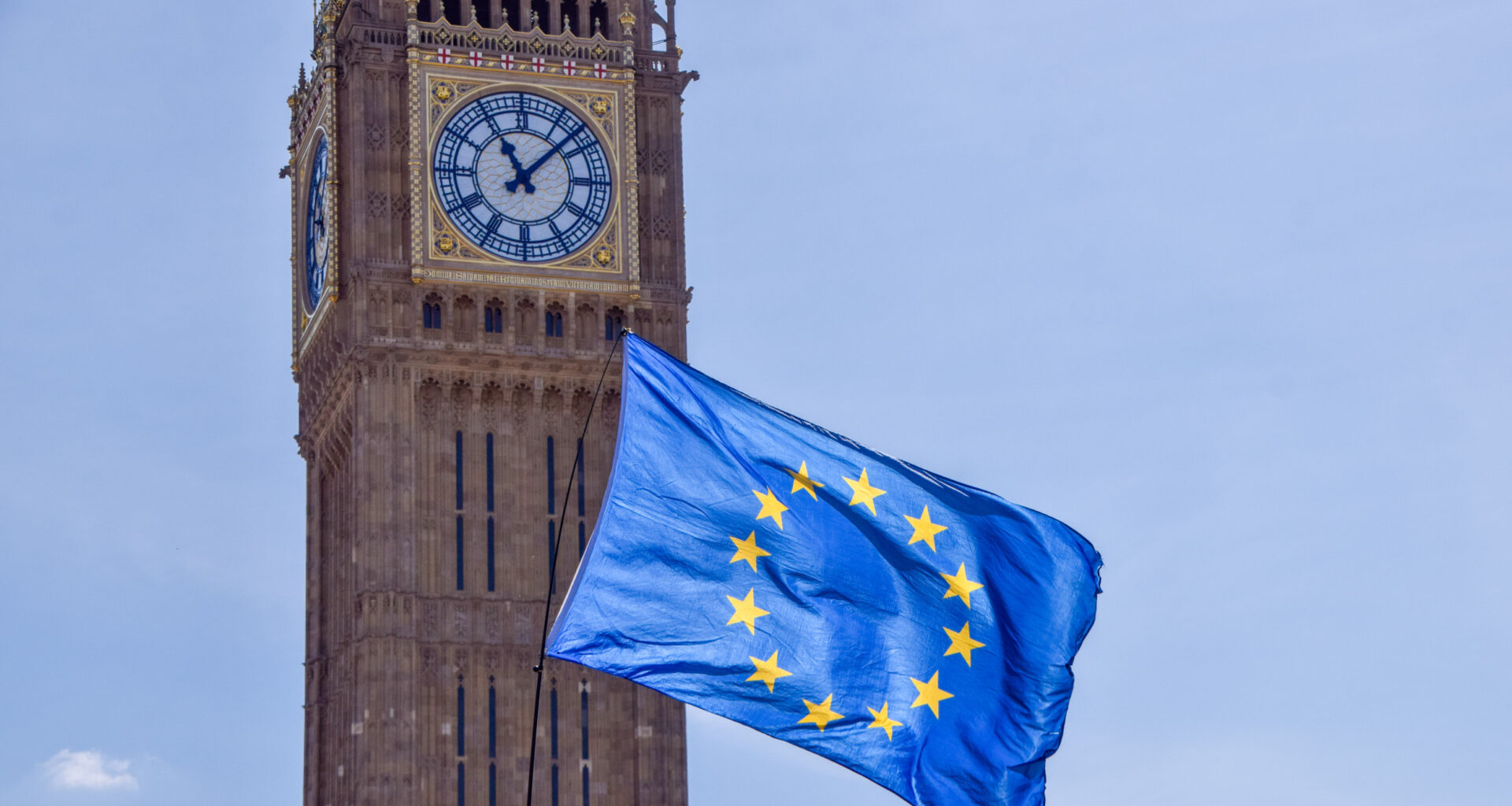Europe is losing ground fast. Since 2000, productivity growth has lagged 30 percent behind the U.S. The same trend holds for venture capital (VC). Over the past decade, the European Union (EU) has averaged just 0.3 percent of GDP in VC funding, less than one-third of American levels. Beneath these numbers lies a structural failure I’ve witnessed up close: Europe’s inability to transform promising startups into category-defining leaders.
As the U.K. strikes a trade deal with the U.S. this week and the May 19 U.K.-EU summit approaches, Brussels continues to signal hesitation: even a modest British request for mutual recognition of product certifications—a technical step that would ease trade and reduce friction—was recently rejected by key EU member states, including France. If we can’t align on something as basic as product standards, we shouldn’t harbor an illusion that a deeper economic partnership is within reach.

The flag of the European Union flies next to Big Ben.
The flag of the European Union flies next to Big Ben.
Getty Images
U.K. Prime Minister Keir Starmer played the royal card well, tiptoeing around President Donald Trump and securing a symbolic win. However, with Trump, one thing is certain: stability is borrowed time. Tariffs will be back. The U.K. brings deep capital markets and a world-class startup ecosystem. The EU brings a strong industrial manufacturing base and a massive market. Together, both could create an economic powerhouse if only Europe would finally address its chronic aversion to risk and investment.
The problem runs deep, and it’s not just about regulation, but about where Europe’s money actually goes. According to the IMF, Europeans invest just $1 in equities, funds, and pension schemes for every $4.60 Americans put into equivalent asset classes. That figure alone reveals a structural failure in Europe’s ability and willingness to support risk-taking capital.
Under the EU’s Solvency II directive, European pension funds and insurers were granted more flexibility, but at the cost of intense scrutiny under the prudent person principle. All investments, particularly in non-traditional assets like venture capital, must be fully documented, justified, and continuously monitored. In theory, this ensures responsibility. In practice, it breeds a culture of caution.
As Jimmy Nielsen, founder of European-based Heartcore Capital, recently pointed out, a pension fund faces nearly the same regulatory burden whether it invests €20 million in a VC fund or €150 million in infrastructure. The result? Small, high-risk investments are too expensive and administratively burdensome to justify and thus are ignored, not because they’re unworthy, but because the system makes them unattractive.
Thus, a new approach is needed. An Economic NATO, with three principles highlighted below, should focus on pragmatic coordination, not political integration, and crucially, it must include the U.K.
First: Regulation with growth in mind. National regulators must commit to a genuine reassessment of how Solvency II treats risk capital. This is not about loosening standards, but about introducing proportionality: small investments in growth funds should not carry the same regulatory burden as billion-euro investments in low-risk infrastructure.
Second: A pan-European fund of funds. The European Investment Fund should launch a dedicated €100 billion fund-of-funds platform targeting venture capital funds, focused on innovation in frontier technologies. The U.K. government should match this effort through the British Business Bank, ensuring symmetrical access across the Channel.
Third: More efficient capital markets. The EU should eliminate unnecessary bureaucracy and harmonize listing requirements and approval procedures across member states. Instead of dozens of national regulators and parallel exchanges, we need a single standard for IPOs and secondary trading. This would cut costs, boost liquidity, and make it easier for European growth companies to stay and scale at home. At the same time, the EU and U.K. should establish mutual recognition of IPO requirements, allowing European companies to access capital more efficiently.
Capital allocation is no longer just a financial issue, but a matter of security. That’s why the U.K.-EU summit on May 19 is the perfect opportunity to rethink the framework for economic coordination.
The Franco-German engine that built the EU must be recalibrated. French President Emmanuel Macron should challenge the incoming German Chancellor Friedrich Merz to match France’s substantial €109 billion investment pledge in AI. And the European Commission president must elevate capital markets reform from a technocratic side project to a political priority.
Europe’s economic sovereignty is at stake. Without a coordinated effort, it risks becoming a continent of good ideas but few breakthroughs. We have a choice: either we cling to fragmentation and watch startups head to Silicon Valley, or build an Economic NATO that unlocks capital, ambition, and growth. The tools exist. The time is now. And all we lack is the political courage to act.
Lucas Ohrt is a 20-year-old student at Copenhagen Business School and an investment analyst at BlackWood, a pan-European venture capital fund. He is also the co-founder of Unge Iværksættere, Denmark’s largest youth entrepreneurship organization.
The views expressed in this article are the writer’s own.
